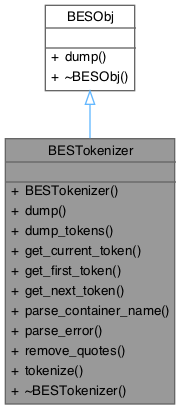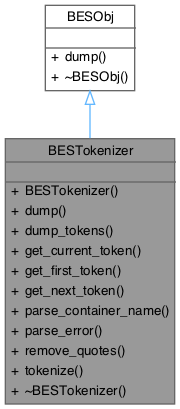tokenizer for the BES request command string More...
#include <BESTokenizer.h>


Public Member Functions | |
| virtual void | dump (std::ostream &strm) const |
| dumps information about this object | |
| void | dump_tokens () |
| dump the tokens that have been tokenized in the order in which they are parsed. | |
| std::string & | get_current_token () |
| returns the current token from the token list | |
| std::string & | get_first_token () |
| returns the first token from the token list | |
| std::string & | get_next_token () |
| returns the next token from the token list | |
| std::string | parse_container_name (const std::string &s, unsigned int &type) |
| parses a container name for constraint and attributes | |
| void | parse_error (const std::string &s="") |
| throws an exception giving the tokens up to the point of the problem | |
| std::string | remove_quotes (const std::string &s) |
| removes quotes from a quoted token | |
| void | tokenize (const char *p) |
| tokenize the BES request/command string | |
Detailed Description
tokenizer for the BES request command string
BESTokenizer tokenizes an BES request command string, such as a get request, a define command, a set command, etc... Tokens are separated by the following characters:
'"' ' ' '
' 0x0D 0x0A
When the tokenizer sees a double quote it then finds the next double quote and includes all test between the quotes, and including the quotes, as a single token.
If there is any problem in the syntax of the request or command then you can use the method parse_error, which will display all of the tokens up to the point of the error.
If the user of the tokenizer attempts to access the next token before the first token is accessed, a BESExcpetion is thrown.
If the user of the tokenizer attempts to access more tokens than were read in, an exception is thrown.
Definition at line 67 of file BESTokenizer.h.
Constructor & Destructor Documentation
◆ BESTokenizer()
| BESTokenizer::BESTokenizer | ( | ) |
Definition at line 44 of file BESTokenizer.cc.
◆ ~BESTokenizer()
| BESTokenizer::~BESTokenizer | ( | ) |
Definition at line 49 of file BESTokenizer.cc.
Member Function Documentation
◆ dump()
|
virtual |
dumps information about this object
Displays the pointer value of this instance
- Parameters
-
strm C++ i/o stream to dump the information to
Implements BESObj.
Definition at line 321 of file BESTokenizer.cc.
◆ dump_tokens()
| void BESTokenizer::dump_tokens | ( | ) |
dump the tokens that have been tokenized in the order in which they are parsed.
Dumps to standard out the tokens that were parsed from the request/command string. If the tokens were quoted, the quotes are kept in. The tokens are all displayed with double quotes around them to show if there are any spaces or special characters in the token.
Definition at line 306 of file BESTokenizer.cc.
◆ get_current_token()
| string & BESTokenizer::get_current_token | ( | ) |
returns the current token from the token list
Returns the current token from the token list and returns it to the caller.
- Returns
- current token
- Exceptions
-
BESError if the first token has not yet been retrieved or if the caller is attempting to access more tokens than are available.
- See also
- BESError
Definition at line 104 of file BESTokenizer.cc.
◆ get_first_token()
| string & BESTokenizer::get_first_token | ( | ) |
returns the first token from the token list
This method will return the first token from the token list. Whether the caller has accessed tokens already or not, the caller is returned to the beginning of the list.
- Returns
- the first token in the token list
Definition at line 88 of file BESTokenizer.cc.
◆ get_next_token()
| string & BESTokenizer::get_next_token | ( | ) |
returns the next token from the token list
Returns the next token from the token list and returns it to the caller.
- Returns
- next token
- Exceptions
-
BESError if the first token has not yet been retrieved or if the caller is attempting to access more tokens than are available.
- See also
- BESError
Definition at line 123 of file BESTokenizer.cc.
◆ parse_container_name()
parses a container name for constraint and attributes
This method parses a string that contains either a constraint for a container or attributes for a container. If it is a constraint then the type is set to 1, if it is attributes for the container then type is set to 2. The syntax should look like the following.
<container_name>.constraint= or <container_name>.attributes=
The equal sign must be present.
- Parameters
-
s the string to be parsed to determine if constraint or attributes type set to 1 if constraint or 2 if attributes
- Returns
- the container name
- Exceptions
-
BESError if the syntax is incorrect
- See also
- BESError
Definition at line 255 of file BESTokenizer.cc.
◆ parse_error()
| void BESTokenizer::parse_error | ( | const std::string & | s = "" | ) |
throws an exception giving the tokens up to the point of the problem
Throws an excpetion using the passed error string, and adding to it the tokens that have been read leading up to the point that this method is called.
- Parameters
-
s error string passed by caller to be display with list of tokens
- Exceptions
-
BESSyntaxUserError with the passed error string as well as all tokens leading up to the error.
Definition at line 65 of file BESTokenizer.cc.
◆ remove_quotes()
| string BESTokenizer::remove_quotes | ( | const std::string & | s | ) |
removes quotes from a quoted token
Removes quotes from a quoted token. The passed string must begin with a double quote and must end with a double quote.
- Parameters
-
s string where the double quotes are removed.
- Returns
- the unquoted token
- Exceptions
-
BESError if the string does not begin and end with a double quote
- See also
- BESError
Definition at line 290 of file BESTokenizer.cc.
◆ tokenize()
| void BESTokenizer::tokenize | ( | const char * | p | ) |
tokenize the BES request/command string
BESTokenizer tokenizes a BES request command string, such as a get request, a define command, a set command, etc... Tokens are separated by the following characters:
'"' ' ' '
' 0x0D 0x0A
When the tokenizer sees a double quote it then finds the next double quote and includes all test between the quotes, and including the quotes, as a single token.
When a "\" is character is encountered it is treated as an escape character. The "" is removed from the token and the character following it is added to the token - even if it's a double qoute.
- Parameters
-
p request command string
- Exceptions
-
BESError if quoted text is missing an end quote, if the request string is not terminated by a semiclon, if the number of tokens is less than 2.
- See also
- BESError
Definition at line 162 of file BESTokenizer.cc.
The documentation for this class was generated from the following files: